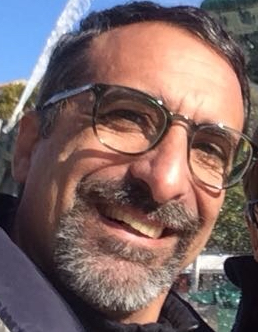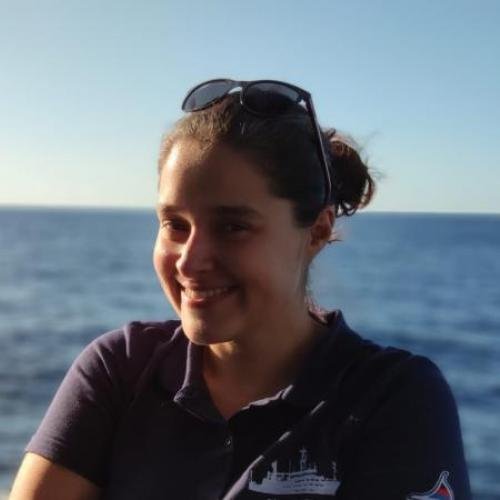We are a group of international marine researchers (MARE-UL, IDL, NIOZ, PML, EAU, MARUM/Uni-Bremen) in topics related to marine biogeosciences, climate change and atmosphere-ocean-seafloor interactions.
CATARINA V. GUERREIRO (PhD). Marine biogeoscientist with expertise in coccolithophore signatures from sediments and water column in present-day marginal to open-ocean environments, its application as a tool to unravel (paleo)environmental variability, and its role in the biological carbon pump. Currently leads project FCT-CEECIND CHASE at MARE/ARNET and IDL. Her first steps exploring the effects of Saharan dust in the Atlantic started in 2015, when she received a MSC COFUND Fellowship to work at the University of Bremen. More info.
VANDA BROTAS (PhD). Marine biologist with a broad experience in topics related to marine ecology, including spatio-temporal dynamics of marine phytoplankton, phenology of the phytoplankton spring bloom and validation of satellite ocean colour with in situ data. Senior researcher at MAR/ARNET, full professor at the FCUL, and visiting professor at the Plymouth Marine Laboratory. She has been the PI of several Portuguese-funded projects and the Portuguese representative of EU-funded projects and ESA-projects. More info.
JAN-BEREND STUUT (PhD). Marine geologist with a large experience dealing with the transport, dynamics and deposition of desert dust. Senior Researcher at Royal Netherlands Institute for Sea Research (NIOZ), and Utrecht University, and part-time professor at Vrije Universities Amsterdam. Former PI of two large projects focusing on dust research: TRAFFIC and DUSTTRAFFIC, funded by the Dutch National Science Foundation (NWO) and the European Research Council (ERC), respectively. More info.
KARL-HEINZ BAUMANN (PhD). Marine geologist and micropalaeontologist with an extensive and world-wide experience in paleoceanography and paleoclimatology, using the living and fossil record of coccolithophores as environmental proxies, exploring its seasonal export production and contribution for the carbonate budget. He has been mostly working in the Atlantic Ocean, but also in the upwelling regions off Chile and Somalia. Currently works as a Senior-researcher at the University of Bremen and member of MARUM. More info.
MÁRIO CACHÃO (PhD). Geologist specialized in micropaleontology (Calcareous nannofossils) with broad experience in topics related to marine paleoecology and paleoceanography from deep ocean to coastal facies, including multivariate statistical analysis and morphometrics. He currently works as a Senior-researcher at IDL/FCiências.ID and as an associate professor at the FCUL. He has been the PI of Portuguese-funded projects and cooperates with several other national and international projects. More info.
ANA AMORIM (PhD). Marine biologist with expertise in biology and ecology of phytoplankton, with emphasis on the ecological significance of different life-cycle stages in harmful algal bloom dynamics. The research approach includes present day observations and looking back into the history of blooms using the fossil record of dinoflagellate cysts. Currently works as a senior researcher at MARE/ARNET, assistant professor at FCUL, and curator of the University of Lisbon culture collection (ALISU). More info.
ANDY REES (PhD). Biogeochemist. Leader of the UK Atlantic Meridional Transect (AMT) project (2007-present) and senior researcher at PML. He has participated in, and led research projects and oceanographic expeditions on a global scale including to Arctic and Antarctic regions. His research is focused on the biogeochemical cycling in the marine environment, and on the impact of environmental change on the biological and chemical processes which control the ocean and atmospheric exchange of greenhouse gases. More info.
STEVE GROOM (PhD). Head of Science at PML, leading the Earth Observation science and applications area, and Director of the NERC Earth Observation Data Acquisition and Analysis Service (NEODAAS) in Plymouth (UK). His research is focused on the application of remote sensing to investigate marine and coastal processes, including near-real time and operational Earth observation, biological processes, coccolithophore blooms, harmful algal blooms, airborne remote sensing, web-based visualisation and integration of data. More info.
AFONSO FERREIRA (PhD student). Marine biologist at MARE/ARNET. His research is focused on exploring time-series data of environmental parameters from satellite remote sensing for disclosing links between climate-driven variability and marine phytoplankton offshore Iberia and around the Northern Antarctic Peninsula. His participation on expeditions AMT28 and OPERANTAR37-38 was crucial for collecting atmospheric dust samples across the Atlantic Ocean, as well as coccolithophore samples from the Southern Ocean. More info.
ANDREIA TRACANA (MSc). Marine biologist and Manager of the Laboratory of Phytoplankton at MARE/ARNET, including the analysis of pigments using a High Performance Liquid Chromatography. Her participation on AMT28 and AMT29 was crucial for the collection of all the coccolithophore and atmospheric dust samples available for CHASE, as well as for measuring the pH across the entire Atlantic Ocean. More info.
ALESSIA FININI (MSc student). Erasmus+ Trainee and MSc in Marine Sciences at the University of Milano-Bicocca (Italy) in collaboration with MARE/ARNET and IDL (concluded). In the course of her ERAMUS+ traineeship and MSc research, she has undertaken the taxonomic and ecological study of coccolithophores living across the South Atlantic Ocean (30-50ºS), based on material collected during AMT28. Her project was embedded in, and benefited from projects CHASE and PORTWIMS (concluded) lead by MARE/ARNET.
FEDERICO MALAVOLTA (MSc student). Erasmus+ Trainee and MSc in Marine Sciences at the University of Milano-Bicocca (Italy) in collaboration with MARE/ARNET and IDL (ongoing). In the course of his ERAMUS+ traineeship and MSc research, he is undertaking the taxonomic and ecological study of coccolithophores living in the South Atlantic Subtropical Gyre, based on material collected during AMT28. His project was embedded in, and benefited from projects CHASE and PORTWIMS (concluded) lead by MARE/ARNET.
MARGARIDA FERREIRA (MSc student). MSc in Marine Sciences at FCUL, in collaboration with MARE/ARNET, IDL and IPMA (ongoing). Her MSc research is focused on the taxonomic and paleoecological study of coccolith species from sediments collected along a coast-to-ocean transect offshore SW Portugal. The study is embedded in, and benefits from projects CHASE and SINES (Climate Change Impact on Ocean Fronts Ecosystems: the case of the Iberian Upwelling System) led by MARE/ARNET and IPMA, respectively.
CATARINA PINHO (MSc student). MSc in Marine Sciences at FCUL, in collaboration with MARE/ARNET, IDL and IPMA (ongoing). Her MSc research is focused on the taxonomic and ecological study of coccolithophore communities and phytoplankton pigments collected along a coast-to-ocean transect offshore SW Portugal. The study is embedded in, and benefits from projects CHASE and SINES (Climate Change Impact on Ocean Fronts Ecosystems: the case of the Iberian Upwelling System) led by MARE/ARNET and IPMA, respectively.














